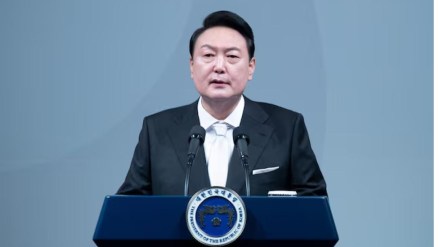South Korea is currently embroiled in one of its most severe political crises in decades, with President Yoon Suk Yeol facing impeachment, severe public backlash, and even allegations of insurrection. The turmoil began with a controversial attempt by Yoon to impose martial law this month, a move that triggered widespread outrage, a quick reversal, and a series of consequential events that continue to ripple through the nation’s political and security landscape.
The Martial Law Controversy and Political Fallout
On December 3, 2024, President Yoon Suk Yeol took the extraordinary step of declaring martial law in response to what he perceived as an opposition plot to destabilize the country. This decision came just days after the National Election Commission’s controversial handling of the April 2024 elections, in which Yoon’s party, the People Power Party (PPP), suffered a significant defeat. Yoon alleged that North Korean cyberattacks had tampered with the election results, although he provided no concrete evidence to support these claims.
In his address to the nation, Yoon asserted that “criminal groups” had hijacked state affairs and must be stopped to preserve South Korea’s democratic system. However, his assertions regarding North Korean interference were met with skepticism, as the National Election Commission denied any irregularities. Despite this, Yoon doubled down, accusing the opposition of working with North Korea to undermine the government.
The declaration of martial law, which included the deployment of military forces and a temporary shutdown of parliament, caused immediate political chaos. Within hours, the martial law was rescinded following fierce opposition from lawmakers, the media, and the public. Yoon’s government appeared weak and disorganized, and his credibility took a significant blow. The controversy over martial law set the stage for the ongoing political instability, as opposition parties, led by the Democratic Party, began calling for his impeachment.
Impeachment Push and Growing Division
In response to the president’s actions, a coalition of six opposition parties submitted an impeachment motion to South Korea’s National Assembly, with a vote scheduled for December 14, 2023. The motion accused Yoon of overstepping his constitutional authority and threatening the democratic order. The ruling PPP, which had initially shown strong support for Yoon, found itself divided. Some members began to shift their allegiance to the opposition, signalling that the president’s grip on power was weakening.
Yoon, however, remained defiant, vowing to “fight to the end” against what he described as a “madness” on the part of his political opponents. The president’s combative stance suggested that he was willing to take the issue to the Constitutional Court, which could take up to six months to rule on the impeachment case. While Yoon’s rhetoric may have rallied some of his political allies, his position seemed increasingly untenable as the scandal continued to unfold.
The Defence Minister’s Suicide Attempt
Amid this turmoil, the situation took a more dramatic and tragic turn with the attempted suicide of Kim Yong Hyun, the former South Korean defence minister. Kim had been a key figure in the martial law decision, carrying out the president’s orders without consulting the prime minister or other senior officials. Kim’s actions, which included sending military helicopters and troops toward the presidential palace, were later deemed a grave misstep. Just hours after the martial law was rescinded, Kim resigned from his post, and was subsequently taken into police custody as part of the ongoing criminal investigation into the president’s decision.
The attempted suicide of Kim Yong Hyun has shocked the nation and raised troubling questions about the personal toll of South Korea’s political crisis. Kim was seen as one of Yoon’s most trusted allies, and his dramatic downfall further highlighted the deepening rift within the government. His failed suicide attempt was a grim symbol of the pressure and emotional strain that many of Yoon’s closest aides are experiencing as the president’s leadership continues to come under fire.
Police Raid and Ongoing Investigation
In the midst of this political turmoil, South Korean police conducted a raid on the office of President Yoon Suk Yeol as part of an ongoing investigation into the martial law decision. The investigation is focused on the president’s role in what is being considered an unconstitutional action, potentially amounting to insurrection. Though Yoon has not been arrested or formally questioned, the raid underscores the seriousness of the charges against him. The special investigation team is looking into the country’s security and administrative systems, with particular emphasis on the president’s handling of the martial law declaration.
This unprecedented raid on the president’s office signals that Yoon’s troubles are far from over, and the investigation into his actions continues to raise the stakes for his political survival. The spectre of impeachment, along with the legal challenges he faces, has placed Yoon in a precarious position, both domestically and internationally.
The Road Ahead: Impeachment or Resignation?
The political crisis surrounding President Yoon is far from resolved. His decision to remain in office, despite the growing calls for his resignation and the impending impeachment vote, suggests that he is prepared to fight for his political survival, even if it means facing the possibility of being removed from office. Whether Yoon can rally enough support to stave off impeachment remains to be seen, but the increasing division within his own party suggests that his presidency is in serious jeopardy.
The attempted suicide of his defence minister, Kim Yong Hyun, adds a tragic dimension to the crisis, highlighting the emotional toll that this political turmoil has inflicted on those closest to the president. As South Korea grapples with this unprecedented crisis, the future of President Yoon Suk Yeol and the stability of the country remain uncertain.
In the coming weeks, the National Assembly will likely vote on the impeachment motion, and the Constitutional Court will ultimately decide whether Yoon will remain in office. Regardless of the outcome, South Korea’s political landscape has been forever altered by this crisis, and its consequences will resonate for years to come.
